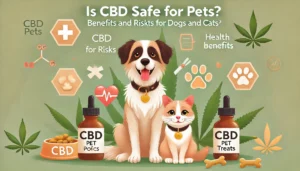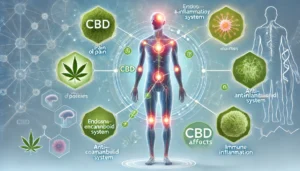
Cannabidiol, commonly known as CBD, is rapidly gaining popularity in the U.S. due to its potential therapeutic benefits. However, there’s often confusion about whether CBD can cause a “high” similar to other cannabis products. Let’s break down what CBD is, how it works, and whether it has intoxicating effects.
What is CBD?
CBD is one of over 100 active compounds found in cannabis. Unlike THC (tetrahydrocannabinol), the compound responsible for the “high” associated with marijuana, CBD does not produce intoxicating effects. CBD interacts with the body’s endocannabinoid system (ECS), a network of receptors and cells that help regulate various functions such as mood, sleep, and immune response. Because of its wide range of effects, CBD is used to relieve pain, reduce inflammation, and alleviate anxiety without causing euphoria.
Does CBD Have Psychoactive Properties?
Yes, CBD is technically psychoactive because it affects the brain and alters mood. Studies have shown that CBD can reduce anxiety and induce relaxation, making it a psychoactive compound. However, it’s important to note that being psychoactive does not mean being intoxicating. Unlike THC, CBD does not impair judgment or motor skills, nor does it cause the loss of control commonly associated with intoxication.
Can CBD Get You High?
No, CBD cannot get you high. The reason for this lies in how it interacts with your brain’s receptors. Specifically, the cannabinoid 1 (CB1) receptor is responsible for the euphoric feeling commonly linked to cannabis. THC activates this receptor, which leads to intoxication. In contrast, CBD does not activate the CB1 receptor, meaning it doesn’t produce the “high” associated with THC.
How Does CBD Differ from THC?
Though both CBD and THC are cannabinoids from the cannabis plant, they have drastically different effects on the brain and body:
- Effects on the Brain: THC activates the CB1 receptor, resulting in euphoria or a high. CBD, on the other hand, doesn’t activate this receptor, which is why it doesn’t have the same intoxicating effects.
- Effects on the Heart: THC can raise heart rate and cause anxiety, especially at higher doses. Conversely, CBD has been found to lower anxiety and has no significant effect on heart rate, even at high doses.
What Are the Effects of CBD?
CBD has numerous effects on the body and brain, many of which are being explored in scientific studies. Some of the known effects of CBD include:
- Relieving pain
- Reducing inflammation
- Decreasing anxiety
- Promoting sleepiness (in higher doses)
- Reducing certain types of seizures
- Counteracting the intoxicating effects of THC
However, CBD can also cause some side effects, particularly in high doses. These side effects include:
- Diarrhea
- Nausea
- Drowsiness or sleepiness
- Low appetite
- Irritability
- Agitation
How Does CBD Interact with THC?
When CBD and THC are combined, they interact in interesting ways. Many medical cannabis products include both cannabinoids, and understanding their interplay can help tailor your experience:
- Enhanced Effectiveness: Some studies suggest that combining THC and CBD may be more effective for conditions like pain management than using either compound alone. THC can enhance CBD’s pain-relieving effects.
- Reducing THC’s Intoxication: There is growing evidence that CBD can reduce THC’s psychoactive strength. By diminishing THC’s activation of the CB1 receptor, CBD may lessen the intensity of the high, making it an option for people who want to benefit from THC’s medicinal effects without feeling overly intoxicated.
Do the Effects of CBD Differ Depending on Its Form?
Yes, the effects of CBD can vary significantly depending on how it’s consumed. Different consumption methods determine how quickly you feel the effects and how long they last:
- Topicals: These include lotions, creams, and balms. Topical CBD does not enter the bloodstream and is mainly used for localized pain relief or skin conditions.
- Smoking or Vaping: Inhalation delivers CBD into the bloodstream almost immediately through the lungs, producing effects within minutes. However, smoking or vaping may lead to stronger psychoactive effects if the product contains even small amounts of THC.
- Edibles and Oils: Consuming CBD through food or oil takes longer to produce effects (up to 2 hours), as it must first pass through the digestive system. However, these effects tend to last longer than inhalation.
- CBD Distillate: This highly purified form of CBD contains no THC and is ideal for those looking to avoid any intoxicating effects.
What Are the Risks of Taking CBD?
While generally considered safe, CBD does come with some risks, particularly when interacting with other substances:
- Medication Interactions: CBD can interact with certain medications, including blood thinners like warfarin (Coumadin) and pain relievers like acetaminophen (Tylenol). Consult your doctor before using CBD if you are on medication.
- Alcohol Interactions: Mixing CBD with alcohol is not fully understood, but the combination could cause excessive sedation. Some studies suggest that CBD may reduce the negative effects of alcohol, such as lowering blood alcohol levels, though more research is needed.
- Long-Term Use: There are some concerns that long-term use of CBD could contribute to liver issues, smaller testicles, or reduced sperm quality. Additionally, CBD may pose risks to babies and children, so it’s not recommended for use during pregnancy or breastfeeding.
Conclusion
While CBD has psychoactive effects, it is not intoxicating and does not cause the high associated with THC. CBD’s effects on the body include pain relief, anxiety reduction, and anti-inflammatory benefits, making it an attractive option for many people. However, it’s essential to understand the differences between CBD and THC, as well as the potential risks involved with taking CBD, especially if you are on medication or consuming alcohol. Always consult a healthcare professional before incorporating CBD into your routine to ensure it’s safe for you.


